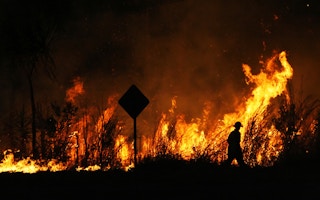There is “no doubt” that climate change is increasing the risk of wildfires around the world, researchers said on Tuesday, as Australia’s government faces criticism for denying devastating bushfires are definitively linked to global warming.
The government insists there is no direct link between climate change and the fires that have killed at least 28 people, destroyed 2,000 homes and razed 11.2 million hectares (27.7 million acres).
However, a review of 57 scientific studies by a team of British academics concluded that global warming is leading to an increase in hot, dry weather around the world that creates the conditions for wildfires to take hold.
There is “no doubt whatsoever” of the link between climate and fire risk, said Iain Colin Prentice, one of the review authors and the director of the Leverhulme Centre for Wildfires, Environment and Society at Imperial College London.
“Australia has measurably warmed by more than a degree … The occurrence of fire is very, very sensitive to temperature,” he told the Thomson Reuters Foundation.
Australia contributes just 1.3 per cent of the world’s carbon emissions, though it is the second-largest emitter per capita after the United States.
Prime Minister Scott Morrison and his emissions reduction minister Angus Taylor say Australia does not need to cut carbon emissions more aggressively to limit global warming, pointing out it has beat its emissions reduction targets for 2020.
They have faced criticism from climate protesters who have dubbed Morrison a “fossil fool”, while the opposition Labor party has called for more resources to prepare for and prevent fire disasters.
All 57 peer-reviewed papers assessed showed links between climate change and increased frequency or severity of hot, dry “fire weather”, found the rapid response review paper published on the ScienceBrief.org online platform.
The studies included global analyses of wildfires as well as research focusing on countries including Australia, the United States, Greece, and Canada.
“
Fire weather does occur naturally, but is becoming more severe and widespread due to climate change.
Richard Betts, head of climate impacts research, Met Office Hadley Centre
The researchers said that fire seasons had lengthened by 20 per cent on average around the world, though the area burned had fallen in recent decades, largely due to the clearing of savannah areas to create farmland, which is less likely to burn.
They said there had been an increase in fire damage to closed-canopy forests, which act as carbon sinks and help mitigate global warming.
“Fire weather does occur naturally, but is becoming more severe and widespread due to climate change,” said professor Richard Betts, a co-author of the paper, and head of climate impacts Research at the Met Office Hadley Centre.
“Limiting global warming to well below 2°C would help avoid further increases in the risk of extreme fire weather.”
The wildfires currently ravaging Australia are “unprecedented” according to analysis by the World Resources Institute, which found there were about four times more fire alerts in 2019 than in any other year in the past two decades.
This story was published with permission from Thomson Reuters Foundation, the charitable arm of Thomson Reuters, that covers humanitarian news, climate change, resilience, women’s rights, trafficking and property rights. Visit http://news.trust.org/climate.

















